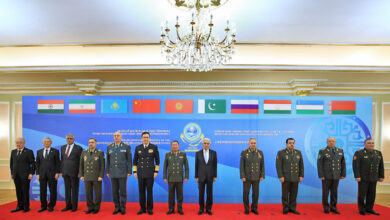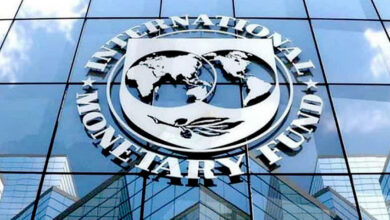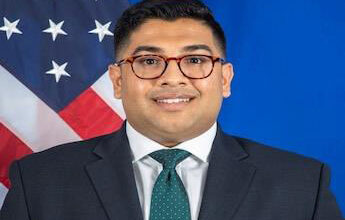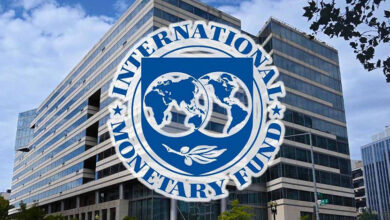Joint Afghan, Indian assault against Pakistani terror at ‘Heart of Asia’
New Delhi. It would not have been pleasant for Sartaj Aziz, Advisor on security and foreign affairs to Pakistan Prime Minister Nawaz Sharif, sitting at the high table as head of the Pakistani delegation for the ‘Heart of Asia’ conference in Amritsar on Sunday, December 4.
India has aimed in recent months, after the attacks on Army bases in Uri and Nagrota in particular, to isolate Pakistan internationally for the role it has played in fostering terrorism in the region and beyond. On December 4, however, it was the Afghan President Mohammad Ashraf Ghani who led a frontal assault on Pakistan for its continuing support to terrorism, during his inaugural address to the sixth ministerial meeting of the Heart of Asia (Istanbul Process) on Afghanistan, held in the city of Amritsar. He even appeared to turn down a Pakistani pledge of financial aid for Afghanistan’s reconstruction.
Naming Mr Aziz directly, President Ghani, speaking of Pakistan’s “generous pledge” of $500 million towards an Afghan reconstruction fund, said, “This fund, Mr Aziz, could very well be used for containing extremism because without peace any amount of assistance will not meet the needs of our people.”
A direct attack of this kind on a participant country at an international conference is not common. While Indian and Afghan leaders had met earlier December 4 to formulate a joint plan to foreground the issue of terrorism, Indian officials confessed to India Strategic that Mr Ghani’s had “surprised” them.
Providing a detailed review of the initiatives taken to bring Afghanistan back on track, President Ghani said, “Our location at the Heart of Asia and the recent momentum gives us the confidence that investment in connectivity in Afghanistan can have Asia-wide impacts and implications,” advocating a “cluster approach” to infrastructure development.
However, “at the heart of the problem are the nature, scale and scope of the fifth wave of political violence and terrorism,” President Ghani said. “Close to 30 groups classified as terrorists by the United Nations are attempting to establish a base in our country…Despite our intense engagement with Pakistan, the undeclared war has not only not abated, but has also intensified during 2016,” he said.
He proposed an “international regime” to “verify cross-frontier activities,” he said, directly pointing to Pakistan. “We do not want a blame game. We want verification,” he concluded, squarely isolating Pakistan.
Beyond the cursory handshake with the Indian Prime Minister and a brief walk with National Security Advisor Ajit Doval and senior Indian officials, Mr Aziz, who sent flowers for ailing Indian External Affairs Minister Sushma Swaraj immediately after he arrived in Amritsar December 3, the Pakistani Advisor did not manage to speak with anyone senior in the Indian government or schedule any talks.
Mr Aziz had decided to personally attend the Heart of Asia (HoA) meeting in Amritsar in the hope that some tensions in the ongoing impasse in India- Pakistan relations could be assuaged. At the fifth ministerial meeting of the HoA in Islamabad in 2015, which Mrs Swaraj attended, a positive outcome in bilateral India-Pakistan ties had emerged, with a dialogue process being scheduled.
There were “three big issues of the conference,” said Arun Jaitley, India’s Finance Minister who co-chaired the Ministerial meeting in the absence of Mrs Swaraj.
Speaking to the media after the two-day conference concluded, Mr Jaitley said, the three issues were;
(i)Countering terrorism to create stability and security in Afghanistan,
(ii) Providing Afghanistan connectivity to strengthen economic activities and
(iii) Development, which is essential for the progress of Afghanistan.
The Amritsar Declaration, released at the end of the HoA meet, “recognizes terrorism as the biggest threat to peace and stability and demands immediate end to all forms of terrorism and all support, financing, safe havens and sanctuaries to it,” Mr Jaitley said.
For the first time, a Heart of Asia Declaration has expressed concern at the violence caused in Afghanistan and the region by terrorist groups like Al Qaeda, Daesh, LeT (Lashkar-e-Toiba) and JeM (Jaish-e-Mohammed) and so on.
Seeking concerted international cooperation to end the terrorist onslaught, the Declaration also calls for early finalization of the draft Comprehensive Convention on International Terrorism and an early meeting of experts to discuss a draft Regional Counter-Terrorism Framework Strategy, recently prepared by Afghanistan, for its early finalization.
The choice of Amritsar as the venue for this conference was not a random one, officials confirmed to India Strategic.
The theme of this year’s conference, ‘Addressing Challenges and Achieving Prosperity,’ is based on the two key pillars, combating terrorism and fostering connectivity and bringing trade, transit and development.
“Amritsar was chosen because it is located on the Grand Trunk Road, for centuries a traditional trade route linking India to Afghanistan and beyond,” an official told India Strategic. The city is less than 50 km to Lahore in Pakistan, 450 km to the Khyber Pass on the Pakistan-Afghanistan border and 620 km to Kabul, the capital of Afghanistan.
Thanking India profusely for its continued and wide-ranging partnership, President Ghani also mentioned the “historic” significance of the “beautiful city of Amritsar, a city that used to be the centre of bills of exchange and commerce connecting India to Central Asia, Russia, Middle East and beyond.”
India’s clear message was that the arterial route to the Heart of Asia has a blockage, in the form of Pakistan. The choice of Amritsar was meant to highlight the fact that India’s connectivity and trade with Afghanistan had been cut by Pakistan because of its problems with India. Islamabad has denied Most Favoured Nation (trading) status to New Delhi, even though India granted Pakistan that facility two decades ago, and Pakistan has refused to give India transit rights through its territory for trade with Afghanistan.
Reiterating this obstruction while speaking at the inauguration of the 6th Ministerial Meeting of the ‘Heart of Asia’ (Istanbul Process) December 4, Indian Prime Minister Narendra Modi spoke of the choice of Amritsar as the venue. “The flow of trade, people and ideas through our region has often intersected in Amritsar on one of Asia’s oldest and longest surface arteries, the Grand Trunk Road. Amritsar reinforces the value of restoring connectivity which is so crucial for the overall growth, stability and economic prosperity of Afghanistan,” he said.
Under the Pak-Afghan Transit Trade Treaty of 2010, Afghanistan can send its trucks into Pakistan to carry its imports overland from Pakistani ports like Karachi and Gwadar. It can also send a restricted list of goods, including dried fruits, carpets and marble to India, through the Wagah border, but India cannot export goods to Afghanistan through this route.
The trilateral agreement between India, Iran and Afghanistan to develop the Chabahar port, and an IRCON rail link between Chabahar and the Afghan border, will give India an alternate route to Afghanistan and Central Asia. The land route through Pakistan is the shortest, the most economically viable and carries the maximum symbolism for seamless connectivity between Asia, South Asia, Central Asia and Europe, and maximum economic advantage for Afghanistan.
The Heart of Asia Istanbul Process was established in 2011 in Turkey to provide a platform to discuss regional issues, particularly encouraging security, political, and economic cooperation among Afghanistan and its neighbours. This region-led dialogue is largely consultative, although Kabul is trying to provide it a more results-oriented framework. Peace and security in Afghanistan, and connectivity, have been the twin themes of the Heart of Asia process.
Other than Afghanistan, the 14 other countries which form the core of the Heart of Asia are Azerbaijan, China, India, Iran, Kazakhstan, Kyrgyzstan, Pakistan, Russia, Saudi Arabia, Tajikistan, Turkey, Turkmenistan, the United Arab Emirates and Uzbekistan. The United States, Britain, Canada, Australia, Japan, Norway and the European Union and international organizations serve as “supporting nations” to the process, to discuss mechanisms to support regional cooperation.
Reaffirming India’s “absolute and unwavering” commitment to Afghanistan, Mr Modi said, “at stake is not just the future of Afghanistan that has invested in a vision of development, democracy, and pluralism, but, the peace and stability of this entire region, and beyond.”
For this to happen, “First, an Afghan-led, Afghan-owned and Afghan-controlled process is key. It is the only guarantor of durability of solutions. Second, we must demonstrate strong collective will to defeat terror networks that cause bloodshed and spread fear,” Mr Modi said.
“Terrorism and externally induced instability pose the gravest threat to Afghanistan’s peace, stability and prosperity. And, the growing arc of terrorist violence endangers our entire region. As such, support for voices of peace in Afghanistan alone is not enough. It must be backed by resolute action. Not just against forces of terrorism, but also against those who support, shelter, train and finance them,” the Indian PM said, though not directly naming Pakistan.
“Silence and inaction against terrorism in Afghanistan and our region will only embolden terrorists and their masters,” Mr Modi declared. Third, our bilateral and regional commitments of material assistance for Afghanistan’s development and humanitarian needs must continue and increase. Fourth, we should all work to build stronger positive connectivity between Afghanistan and other countries of the region.”
“Afghanistan should be at the centre of our connectivity networks, not peripheral to them. On our part, we see Afghanistan as the hub for strengthening links of connectivity between South Asia and Central Asia,” Mr Modi said. “We cannot deny that the more connected Afghanistan is with the regional arteries of trade, capital and markets, the more assured would be its economic growth and progress. President Ghani and I have converged on the priority of strengthening trade and transport linkages with other partners in the region,” Mr Modi concluded.
“The discussions and the Declaration reiterated the strong support from the Heart of Asia countries for Afghanistan’s efforts to use its geographic location to enhance wider regional economic cooperation. Specific initiatives in this regard including the India-Iran-Afghanistan Trilateral Agreement on developing Chabahar were acknowledged,” Mr Jaitley noted.
On India’s part, we are also engaged bilaterally with Afghanistan to upgrade our connectivity linkages with the aim of making Afghanistan, in the words of the Indian Prime Minister, “A geography of peace,” Mr Jaitley said.
Sadly for Mr Sartaj Aziz, the Pakistani delegation did not even get to visit the Golden Temple, Sikhism’s holiest shrine and an oasis of peace, December 4 as the day coincided with a major Sikh festival and security for the visit was refused. The Indian government had arranged for all delegations to visit the shrine December 3.





